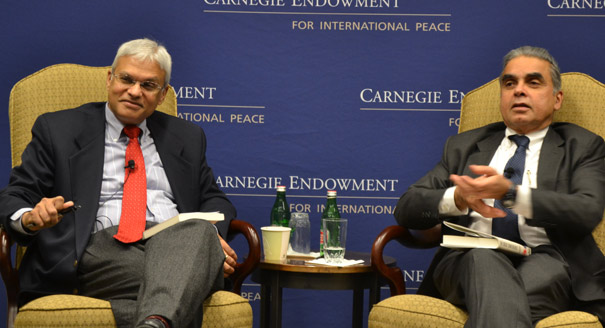Registration
You will receive an email confirming your registration.
In The Great Convergence: Asia, the West, and the Logic of One World, Kishore Mahbubani assesses East and West at a remarkable turning point in world history. With the creation of a world-wide middle class, there is an unprecedented convergence of interests and perceptions, cultures and values: a truly global civilization. But while the world changes, ways of managing it must evolve.
At the U.S. launch of his new book, Mahbubani presented new policies and approaches to governance in an increasingly interconnected and complex environment. Carnegie’s Ashley J. Tellis moderated.
A New Narrative
Mahbubani challenged what he characterized as a Western perspective that tends to interpret changes to the international system as signals of global decline. Rather, he countered, the vast majority of the world’s population that lives outside the West is enjoying a higher standard of living that only continues to rise. Mahbubani explained that The Great Convergence aims to show the West that it need not fear these changes, but ought to work to manage them responsibly.
Cause for Optimism
In Mahbubani’s view, global developments over the past several decades have produced remarkable positive changes, creating a world both more interconnected and more livable than ever before.
- Proliferation of Peace: Mahbubani pointed out that the modern world has never been more peaceful, citing a 78 percent decrease in deaths related to major interstate wars since the late 1980s. Likewise, he said, the risk of a great power war is all but nonexistent.
- Exceeding Expectations: Poverty numbers are plummeting worldwide at a rate few anticipated, Mahbubani said. The world is on track to surpass the United Nations’ Millennium Development Goal of halving global poverty by 2015.
- The Growing Middle Class: Mahbubani was especially optimistic about the emergence of robust middle classes in the developing world, noting the size of the middle class in Asia alone is expected to swell by more than three times in the next seven years.
- Unprecedented Connections: At every level, from the international to the individual, Mahbubani saw greater global interconnectedness thanks to shifts in economics, societies, and technologies.
Challenges and Contradictions
Mahbubani acknowledged that, despite these positive trends, major irritants persist in the international system. Nevertheless, he argued, none of these issues are insurmountable or threaten to undo the progress already underway.
- Inevitable Competition: A degree of geopolitical and economic rivalry between Washington and Beijing will no doubt accompany China’s growth, Mahbubani said. But policymakers on both sides should take heart: he added that the close economic ties between the two nations will likely make it the most peaceful and collaborative shift in global power history has known, with no attendant risk of major conflict.
- Islam and the West: Mahbubani portrayed the dynamic between Muslim populations and the West as much more entropic, perhaps because its roots are more emotional than more traditional geopolitical differences. He advised the United States and Israel to more actively pursue a two-state solution to the Israeli-Arab conflict; while not a panacea, Mahbubani argued that this would be a significant step in the right direction.
- New Concerns: A range of nontraditional threats also confronts the world’s policymakers, Mahbubani said. He suggested that in fields like climate change, whose policy solutions will likely demand sacrifices, the challenge will be to ensure an equitable division of the burdens involved.
Managing the Future
All of these changes, Mahbubani concluded, have far outpaced the global governance mechanisms of the post-World War II international system. Reforming those institutions to meet today’s demands need not be a painful process, but Mahbubani believes it will require the West to commit to close introspection and hard choices.
- We’re Number One? Mahbubani described a reluctance among U.S. policymakers to even imagine a world without unquestioned American primacy. But with China set to outpace the U.S. economy within the next several years, he advised that Washington would do well to strengthen international institutions that promote its values and ensure a level playing field even absent American hegemony.
- Playing by the Rules: Tellis suggested that, since hegemonic powers often disregard international organizations when such institutions prove incompatible with their aspirations or agendas, Washington might be wary of placing too much trust in China’s willingness to maintain a reformed global order. Mahbubani, however, argued that China’s leadership is highly pragmatic and rational, and will likely conclude that a rule-based international architecture is in its best interest and therefore worth sustaining.
